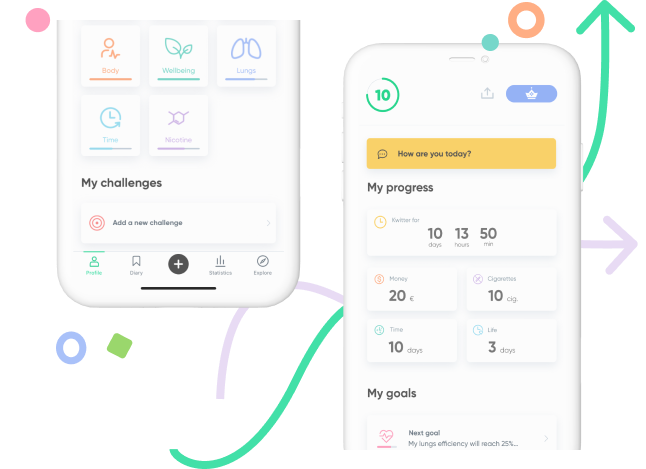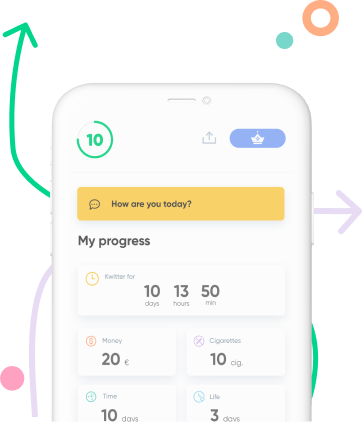November 11, 2020
Tips
How to change your diet to quit smoking without gaining weight?
Wondering how to quit smoking without gaining weight? What if all you had to do was change your diet? Here are tips to do it.
Smoking and diet don't seem to have anything in common. However, both influence your health. Smoking alters your metabolism, which has an impact on the way you eat, and therefore on your weight. A question then arises when you quit smoking: do you need to change your diet to stop smoking without gaining weight?
Why change your diet when you quit smoking?
It’s well known that quitting smoking is usually not free of symptoms such as insomnia or anxiety. In addition, many people are afraid of gaining weight from quitting smoking. These side effects can be discouraging, but the good news is that by adapting your diet, you can limit them! However, if you want to change your diet when you quit smoking, we advise you to plan ahead. Indeed, since quitting is already a stressful period, thinking about a change in diet at the same time could represent an additional stress load. Here we offer you some advice that should help you if you want to change your diet when you quit smoking.
Step 1: Take stock of your diet
It can be difficult to realize what you're eating if you don't decide to pay attention to it. This step is essential.
To make this assessment, try to keep track of everything you eat over a three-day period, from your morning coffee, afternoon snacks, and evening meal. Try to be as accurate as possible in terms of quantities. After these three days, take stock. Have you eaten enough fruit and vegetables? Dairy and cereal products? Drink enough water? Lots of coffee or tea? Are you getting enough protein, fat or carbohydrate sources of good quality?
Step 2: Balance your diet by adopting new eating habits
If after this assessment, it turns out that your diet is not balanced, you can adapt it by starting with what is easiest for you. You don’t know where to start? These five tips will help you.
Enjoy your meals
One of the easiest things to start with is to take the time to enjoy your meals. Too many people eat in an almost mechanical way, without really being aware of what they are doing. Break with this pattern and be aware of the different flavors of food, its textures, etc. Taking the time and enjoying your food is important because you become more aware of what you are doing, and therefore satiety comes faster. Moreover, it’s beneficial to your digestion!
Don’t skip meals
Skipping one meal may encourage you to snack before the next. In addition, your metabolism may also go into a waking state so that you don't suffer too much, and then start storing fat until you eat again. In the end, it’s these little cravings that can make you fat!
Eat balanced, eat varied!
In terms of fruit and vegetables, the recommended intake is five portions per day, with an average weight of 80 to 100g. Feel free to vary them according to your tastes!
It’s also important to eat starchy foods, which, contrary to popular belief, don’t make you fat. It’s nevertheless preferable to eat whole grains, which are richer in fiber and more satisfying. And what if instead of just eating pasta, you try something else? Sweet potatoes, legumes, etc. are all possibilities at your disposal!
Finally, as far as protein sources are concerned, it’s not recommended to eat protein from animal sources more than twice a week. The rest of the time, why not test seeds or nuts, sources of omegas? Or spirulina?
Favor fresh and lightly processed foods
Processed foods are most often accompanied by a number of additives that keep them longer, but also by sugar and salt that enhance their flavor. However, these various additions and the manufacturing processes inherent to industrial cooking have removed many of the nutrients from these foods. As a result, they are less interesting in nutritionally speaking, in addition to being less healthy and generally less good tasting.
It can be a good reason to cook your own meals! "Cooking has destressing virtues on some people, and moreover, what could be more rewarding than eating the fruits of your labor? If you're feeling adventurous, why not try these 3 healthy recipes when you decide to quit smoking.
Drink enough and choose water first
We don't think about it often enough, but drinking enough water is essential! In addition to moisturizing, water also has many other benefits. For example, drinking enough water can help alleviate the most common effects of smoking cessation. It helps fight fatigue, headaches and stress. Water also allows you to stop smoking without gaining weight because it promotes a feeling of satiety and improves digestion. Finally, drinking enough water will improve the appearance of your skin that had been damaged by smoking.
Although you should drink enough, it’s not recommended to abuse coffee. Studies show that caffeine not only makes you nervous but also tends to increase anxiety. It’s best to avoid all stressful elements during withdrawal. This doesn't mean that you have to give up coffee altogether if you like it, but it’s better to limit your intake to, say, one cup a day.
In general, water is preferable. You can nevertheless allow yourself small pleasures from time to time, the main thing is that it doesn't become a habit. And why not test these 5 recipes of anti-smoking juice?
In any case, it’s important that after making these changes to your diet you have managed to balance it while enjoying your food. It’s also important to keep in mind that allowing yourself to deviate from time to time is essential to a healthy and sustainable diet. The most important thing is to adopt a diet that suits you.

Step 3: Establish compensation strategies
Worried when times you used to smoke comes, because you're afraid to crack? Establish compensatory strategies!
To avoid taking refuge in food and compulsive snacking, there are several options. For example, when you feel like smoking, you can drink a large glass of water or herbal tea. It’s also possible to try some breathing exercises to help you relax.
Finally, it should be noted that unlike nibbling, snacks are not to be avoided! If you are feeling a little peckish, why not eat an apple, or a yogurt, around 10 am or 4 pm? This will allow you to think about something else while eating nutritious food! Similarly, if you really want to eat a cupcake, don't deprive yourself. It would be counter-productive. The main thing is that overall your diet remains balanced, and that allows you a few small deviations!
Step 4: Taking stock after quitting smoking
A strategy, however good it may be, is useless if it’s not followed! It’s therefore important to take stock of your efforts regularly after quitting smoking.
When you quit, you will feel as though your hunger is increasing. In fact, it will only return to normal. Indeed, since you no longer consume nicotine, you no longer suffer from its appetite-suppressant effect. So don't question all the efforts you've made so far after you stop smoking. Weight gain or any other persistent symptoms should not discourage you. You have changed your habits by quitting smoking and your body simply needs time to adjust. You can be proud of yourself!
Finally, if you wish to continue and complete your efforts, why not also (re)take up sports? Combined, a balanced diet and physical activity can be vectors of success in your withdrawal!




